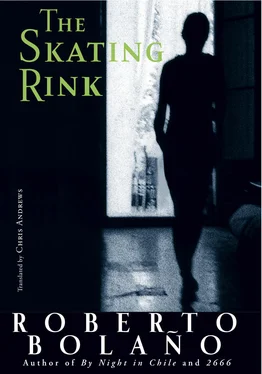Enric Rosquelles:
I would leave the car parked under the old vine arbor
I would leave the car parked under the old vine arbor, Benvingut’s Roman arbor, which had resisted the passage of time and was still there, covered in dust but standing firm. Nuria would arrive around seven, on her bike, and I was almost always by the door, sitting on a wicker chair that I had found in one of the rooms and cleaned and disinfected, before placing it in a cool shady place from which I could spy Nuria’s bicycle when it first appeared on the highway to Y; then it would be hidden for a while by trees, before reappearing on the long road that led straight up to the palace. Once the rink was finished we saw each other every day of course. I would usually bring some fruit — apricots, grapes, pears — a thermos of strong tea, and the radio cassette player that Nuria used for training. She brought a sports bag with her costume and skates, and a bottle of water. She also used to bring books of poetry, a new one every three days or so, which she would browse through during her breaks, leaning against one of the many cases I had decided to leave inside the big shed, so as not to arouse suspicion. Who else knew about the existence of the rink? Well, no one and everyone, in a sense. Everyone in Z knew something or other, but no one was smart enough to put the pieces of information together and form a coherent whole. It was easy to fool them. Actually, I don’t think anyone really cared what was happening with the mansion or the money. Or, no, they did care about the money, of course they did, but not enough to work overtime trying to find out where it had gone. In any case, I was always careful. Not even Nuria knew everything; I told her the rink would be a public facility, and that put an end to her questions, although it was obvious that we were the only ones using the Palacio Benvingut for the duration of that summer. Nuria had her own problems, of course, and I respected that. They say love makes people generous. I’m not so sure; it made me generous with Nuria, but no one else. With other people I became wary and selfish, petty and malicious, perhaps because I knew what a treasure I possessed (a treasure of immaculate purity) and couldn’t help comparing my situation to the filth in which they were all wallowing. I can confidently say that there has been nothing in my life to match the suppers or dinners we had together on the steps leading down from the palace to the sea. Nuria had a way of eating fruit while gazing at the horizon that was, I don’t know, unique. And the view was truly exceptional. We hardly spoke. I would sit on the next step down and look at her now and again (looking for too long could be painful), sipping and savoring my tea. Nuria had two track suits, a blue one with diagonal white stripes, which was, I think, the official tracksuit of the Olympic skating team, and a jet black one, a gift from her mother, which set off her blonde hair and her perfect complexion: she looked like a Botticelli angel flushed with exertion. Instead of looking at her, I looked at the tracksuits, and I still remember every fold, every wrinkle, the way the blue one bulged at the knees, the delicious scent that the black one gave off when Nuria was wearing it and the evening breeze made words superfluous. A scent of vanilla, a scent of lavender. Next to her, I must have looked out of place. You have to remember I came straight from work to our daily meetings, and sometimes I didn’t have time to change out of my suit and tie. But when Nuria was late, I’d get some jeans from the trunk of the car and a thick, loose-fitting Snyder sweatshirt, and take off my shoes and put on some Di Albi mocassins, which are supposed to be worn without socks, although I sometimes forgot. I did all this under the arbor, sweating and listening to the insects. I never put on my tracksuit when she was around. Tracksuits make me look twice as fat as I am, they expand my waist mercilessly, and I fear they even make me look shorter. Once Nuria tried to get me to skate with her for a while. Excuse me for laughing. I guess she wanted to see me in the middle of the rink, which is why she brought another pair of skates that evening and absolutely insisted that I put them on. She even lied, Nuria, who never told a lie, she said that for the routine she wanted to practice, she needed somebody beside her. I had never seen her behave like that, like a spoilt, sulky child, like a tyrannical princess, but I put it down to tiredness, boredom and maybe nervous tension. Her big day was approaching, and although I told her that she was skating wonderfully, who was I, really, to judge? In any case, I never put on the skates. Out of cowardice, fear of ridicule or falling over, or because the rink was there for her benefit, not mine. But I did occasionally dream I was skating. If you’ve got time I can tell you about it. Not that there’s much to tell: I was simply there, in the middle of the rink, with skates on my feet, and all the building work I had been planning on before they found me out was complete: comfortable new seats on both sides of the rink, showers, massage tables, an immaculate dressing room, and I could skate, I could spin and leap, I was moving smoothly over the ice, riding on absolute silence. .
Remo Morán:
I have very few clear memories of Nuria’s second visit to the hotel
I have very few clear memories of Nuria’s second visit to the hotel. She came to the Del Mar at lunchtime, like before, but didn’t have coffee or want to go up to my room. She felt claustrophobic in the hotel, so we went for a drive. When we got into the car, I was the one feeling claustrophobic; I’m a terrible driver, I don’t like cars, and although I own one, it’s mainly used for transporting supplies to the hotel, and I don’t even do that myself. For a while we drove around aimlessly on inland roads; the heat was stifling and we sweated profusely, not saying a word. With a sudden sinking feeling I thought she might have come to split up with me. Pines, orchards, empty riding schools and old wholesale pottery stores slid by so slowly it was excruciating. Finally, between yawns, Nuria suggested we go back to the hotel. When we got there, we went straight up to my room. I remember her skin under the hot shower. I was outside, but because of the steam I was dripping with sweat. She had her eyes shut tightly, as if there was something only she could sense in between the drops of water. As if the numberless scalding droplets were launching an attack on her skin. The water dripping from her perfect legs left a wet trail across the tiles. I put on the air conditioning and watched her go out onto the balcony and look at the sea. Before getting into bed, she cast an eye over my bookshelves and the wardrobes. There wasn’t much to see. I’m looking for microphones, she explained. Nuria’s movements had the peculiar property of continuing to vibrate faintly in a room, or so it seemed, long after she had gone. She cried underneath me, unexpectedly, and that made me stop straight away. Am I hurting you? Go on, she said. Once I would have collected her tears with the tip of my tongue, but the years leave their mark, they paralyze you. It was as if a kick in the ass had sent me flying into another room where there was no need for air conditioning. I opened the curtains, just a little, called the restaurant and asked them to bring up two cups of tea with lemon; then I sat down on the edge of the bed and stroked her shoulder, not knowing what to do. Nuria drank the contents of the teapot, steadily, dry-eyed. At night, when I went to bed, I got into the habit of speaking as if she was there in the room with me. I called her Olympic Gold and dumb things like that, but they made me laugh and even double up with laughter sometimes, which left me feeling inwardly calm, or lucid at least, something I hadn’t felt for a long time. We never talked about love, or even implied that what we did from four to seven had anything to do with love. She had gone out with a boy from Barcelona and often mentioned him. She spoke of him in a curious, distant way, as if his ghost was wandering about in the vicinity. She extolled his athletic virtues, the hours he spent at the gym, his absolute dedication. I often thought she still loved him. Some afternoons the hotel room was like a crater about to erupt. According to Alex it’s impossible to maintain a relationship in the space of a room; sooner or later, one or the other is going to get bored. I agreed, but what could I do? Whenever I suggested going out, she said no; in the evening she was too tired, or something, and I didn’t really feel like doing the rounds of the discos either. One night, though, about two weeks after we met, we did go out, and it was great. A brief but joyful excursion. When I was taking her back to her place (she never invited me in), I said that I found her beauty unnerving. A rash confession, because I knew it was something she didn’t like to talk about. In retrospect her reply stands out as the most significant moment of that night. (We spent the rest of it laughing continuously.) In a vehement tone of voice that banished all doubt, she said that the most beautiful woman she had ever met was an East German skater, the world champion, Marianne something. That was all, but it took me aback. Nuria was obviously a girl who knew exactly what she wanted. Another afternoon she asked me, with what I took to be genuine curiosity, what I was doing in Z, a backwater without a bookshop or a decent cinema. I said it was because of my businesses (an abject lie). Your business is literature, and that’s why you should be living in Barcelona or Madrid. But then I wouldn’t see you any more, I replied. That was going to happen anyway, she told me, because hopefully she’d soon be back on the Olympic skating team and have her grant again. And what will you do if that doesn’t work out? Nuria looked at me as if I was a child, and shrugged her shoulders. Finish my course at the Institute, maybe, give skating classes in some big city in Europe or at a North American university; but deep down she was sure she would get back on the team. That’s what I’m working toward, she said, that’s why I’m training hard. .
Читать дальше












